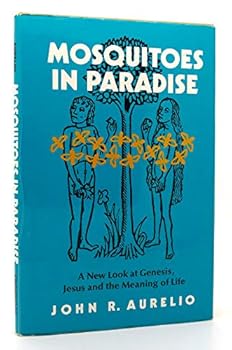Mosquitoes in Paradise
Select Format
Select Condition 
Book Overview
Dustjacket has edgewear. This description may be from another edition of this product.
Format:Paperback
Language:English
ISBN:0824506987
ISBN13:9780824506988
Release Date:January 1985
Publisher:Crossroad Publishing
Length:113 Pages
Weight:3.00 lbs.
Dimensions:0.4" x 5.4" x 8.2"
Customer Reviews
1 rating
Seeks to explain suffering by reinterpreting Creation itself
Published by Thriftbooks.com User , 20 years ago
Having visited the sick and dying in many a hospital and having worked closely with retarded children, John R. Aurelio has heard and asked the question "Why, Lord?" many times. It is very hard for humans to accept pain and suffering visited to the innocent, especially children. As a priest, Aurelio has contemplated the issue long and hard, and Mosquitoes in Paradise represents the sum totals of his thoughts on the matter. He makes a very interesting argument in this book, although I can't say that I agree with his thesis (which he himself admits is only a hypothesis). I should make clear that this is not really a book about coping with grief and sorrow in a practical way - it is geared more toward understanding it than coping with it. The book is organized into small sections which the author recommends reading and reflecting upon over the course of many days. Early on, Aurelio suggests topics and sample prayers to reflect upon, but the second half of the book consists of his proposed reinterpretation of Paradise, Original Sin, and the Fall of Man. Aurelio suggests that Eden was not the Paradise we have envisioned, that Adam and Eve may well have experienced pain and suffering to some degree, known of physical death, hungered, worked the land, and lived in less than perfect harmony with the animals. Aurelio's Garden of Eden would have included such pests as mosquitoes (hence the book's intriguing title). After putting forth an illustrative story of Eve eating the forbidden fruit out of hunger, Aurelio immediately has the swarming mosquitoes bite her. He places a lot of emphasis on the fact that God looked upon Creation and saw that it was "good" or "very good," arguing that this implies it could have been better. Aurelio goes on to make the bold suggestion that life today is no different than life in the Garden of Eden before the Fall - the only thing that has changed is man himself, he argues. This by implication means that man can rediscover that Paradise here on Earth, and this can only be achieved through Jesus Christ. Whereas Adam initially saw the interconnectedness of all things in the world, his sin against God's faith forced a self-centered perspective upon him. Since the Fall, man has concentrated on the things he does not have because he does not see the unity of all things. The Kingdom of God is here, Aurelio suggests, and those who believe in Jesus can enter this kingdom right now. What does all this have to do with the difficult issue of bad things happening to good people? Aurelio makes hay of the idea that sin causes disease and sickness, which is well and good. The problem he ran into with this viewpoint is the fact that it makes God appear as if He is dispensing arbitrary punishments for no reason. He avoids this difficult question altogether by suggesting that pain and suffering did, to some degree, exist in Paradise even before Adam and Eve committed the Original Sin. If this were true, then no one can say that pain





